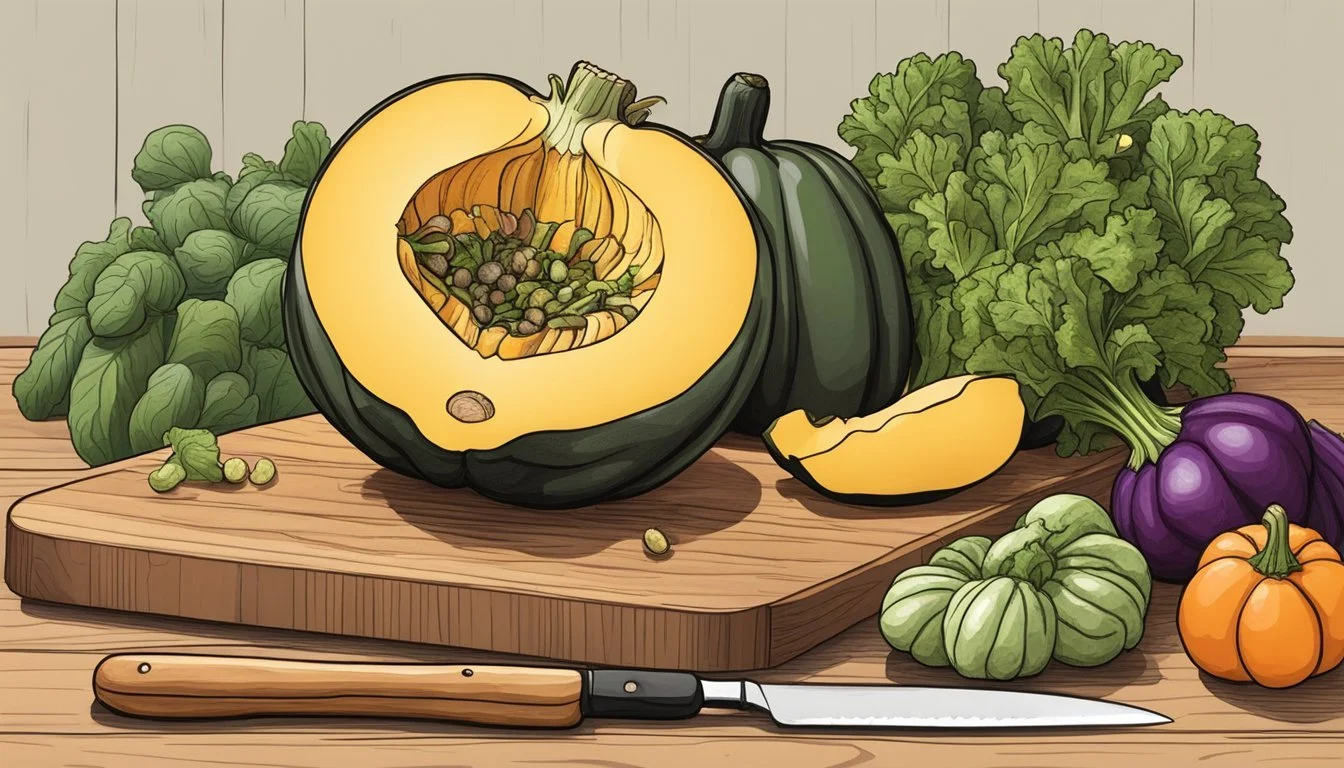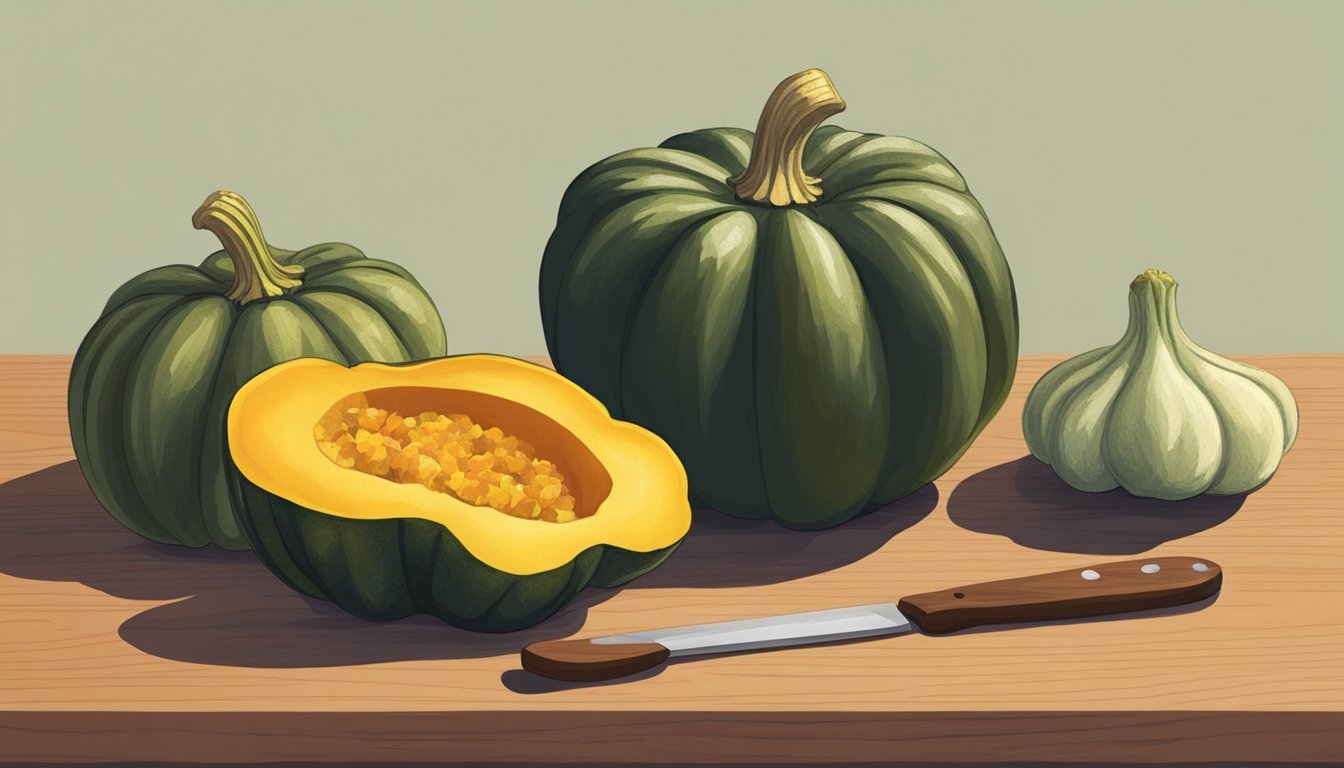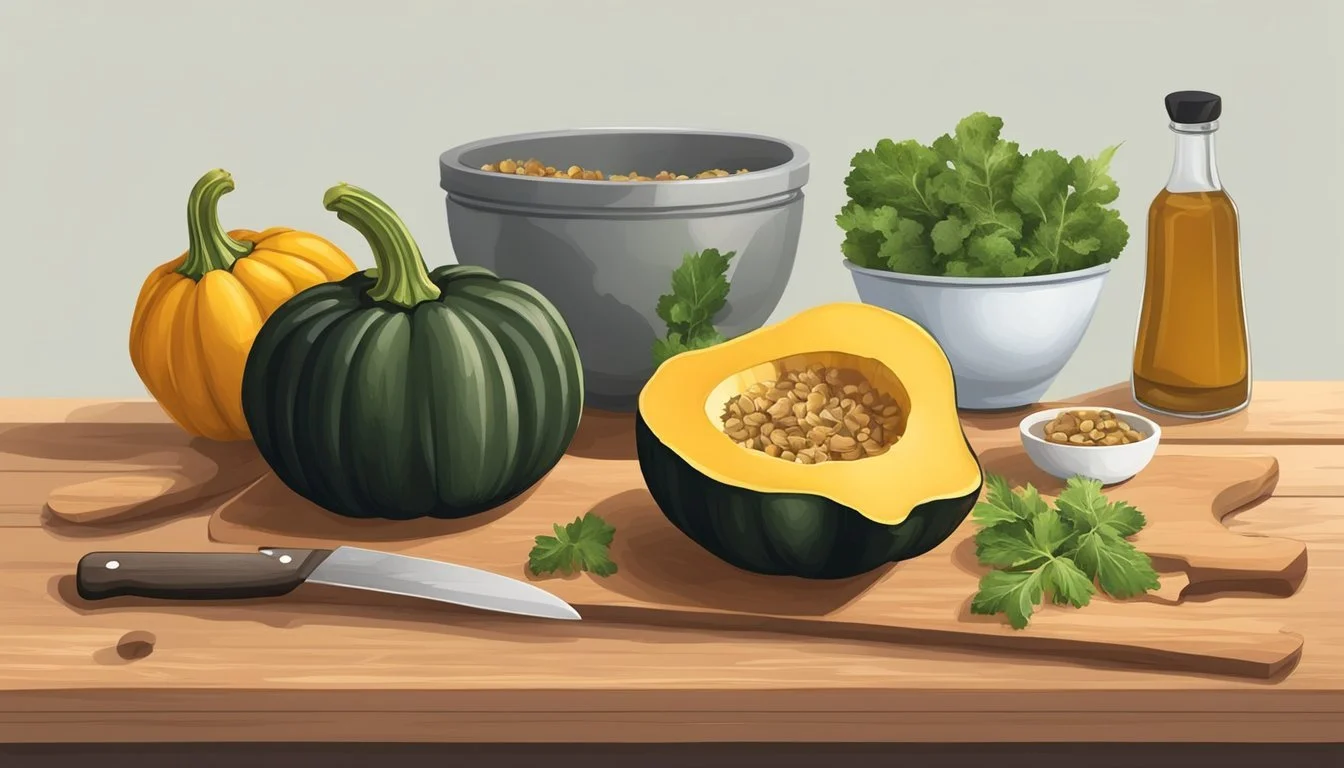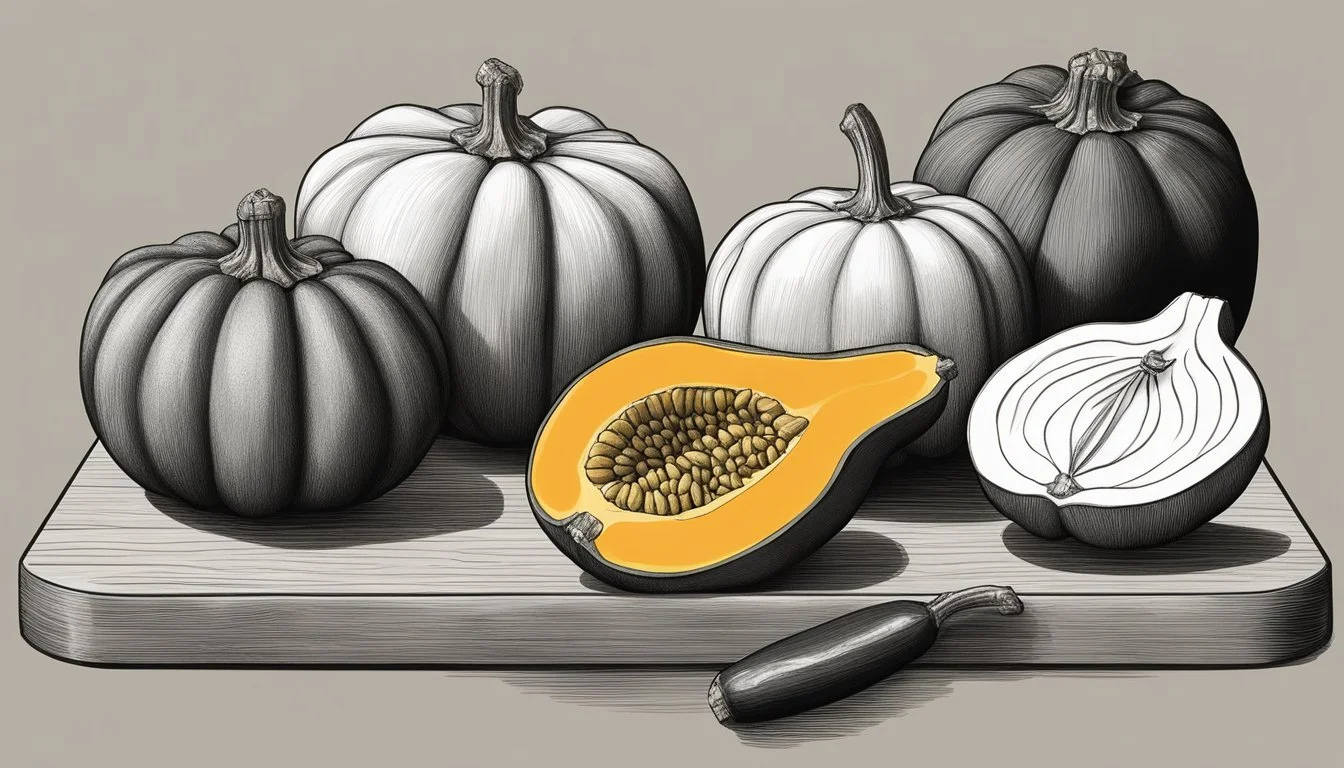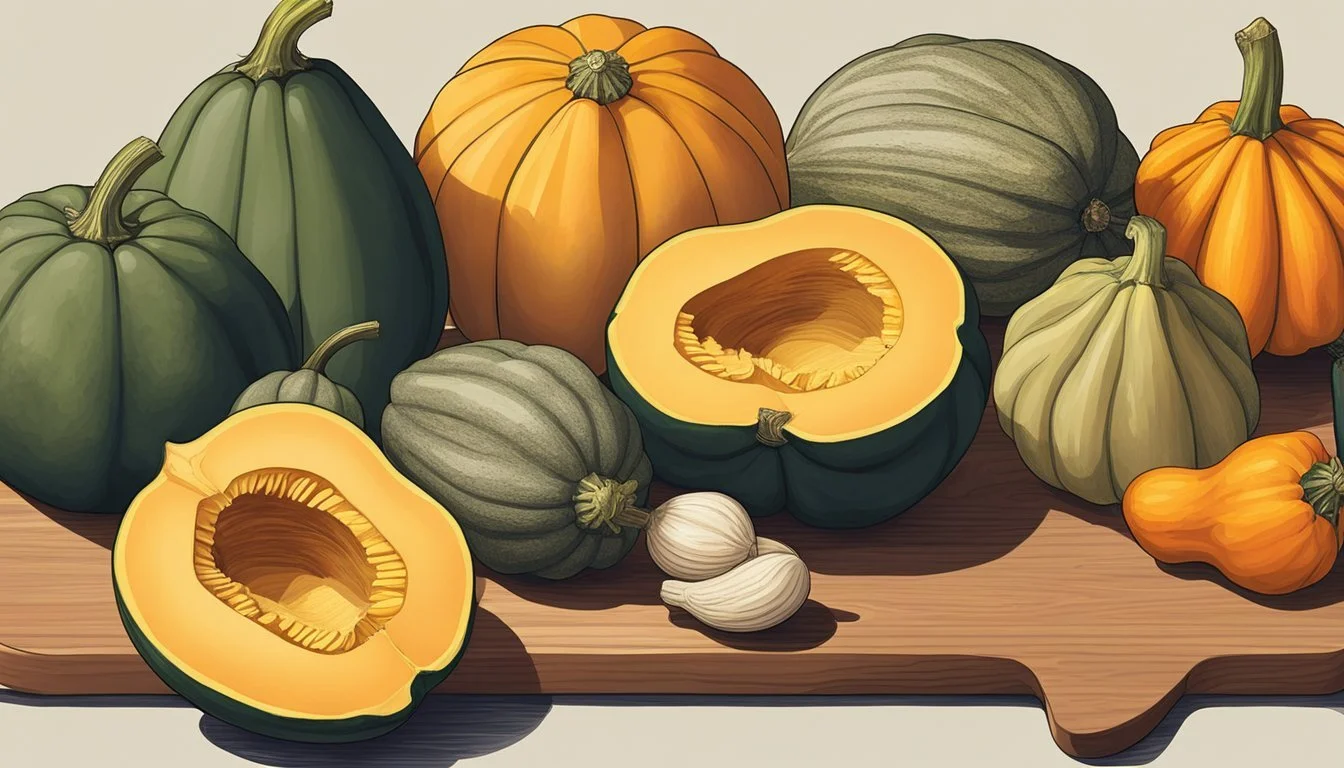Acorn Squash Substitutes
Best Alternatives for Cooking
When it comes to versatile cooking, finding a good substitute for acorn squash can be crucial. Whether it's the slightly sweet, earthy flavor, or the fibrous texture of acorn squash you're after, there's a variety of alternatives that can meet your needs. Butternut squash, with its sweet, nutty taste and smoother texture, tops the list of acorn squash substitutes.
In addition to butternut squash, other suitable substitutes include pumpkin and buttercup squash. Pumpkin offers a similar earthy, sweet taste that works well in both savory and sweet dishes. Buttercup squash, known for its rich flavor and creamy texture, is another excellent option when acorn squash is not available.
For those looking to venture beyond squashes, sweet potatoes can also stand in as a viable substitute. Their color and texture are akin to several types of squash, making them a good fit for recipes like soups, stews, and casseroles. The key to successful substitution lies in understanding the unique flavors and textures of these alternatives, ensuring a seamless transition in any dish.
Understanding Acorn Squash
Acorn squash is a type of winter squash known for its distinct shape and flavor. This squash is typically small with a green exterior and deep ridges, resembling an acorn in shape.
The flesh of acorn squash is dense and has a sweet, nutty flavor. This makes it a popular choice for both savory and sweet dishes.
Roasted: Acorn squash can be sliced and roasted, enhancing its natural sweetness.
Baked: Baking the squash softens its dense flesh, making it easier to mash or puree.
Nutritional Profile:
Rich in vitamins A and C
Good source of dietary fiber
Contains essential minerals like potassium and magnesium
Popular Uses:
Soups and stews
Mashed or pureed as a side dish
This versatility, combined with its unique taste and texture, makes acorn squash a staple in many kitchens during the cooler months.
Reasons for Substituting Acorn Squash
People might choose to substitute acorn squash for several reasons.
Obtaining acorn squash out of season can be challenging. Substituting with other readily available squash varieties ensures recipes remain accessible.
Nutritional needs also play a key role. Although acorn squash is rich in vitamins A and C, potassium, and magnesium, these nutrients can be found in comparable squash substitutes like butternut or sweet potatoes.
Dietary preferences and restrictions can require a substitute. Acorn squash's slightly stringy texture might not appeal to everyone. Butternut squash, with its smoother and creamier consistency, can be a more suitable alternative in many dishes.
Caloric content is another consideration. Acorn squash is low in calories, making it a healthy choice. If similar nutritional benefits are desired, look for substitutes like pumpkin or sweet potatoes, which are also low in calories.
Cooking flexibility is another reason for substitution. Acorn squash can be replaced in recipes that require baking, roasting, or soups. Pumpkin and buttercup squash possess such versatility and can match the sweet and earthy notes of acorn squash.
Many recipes call for acorn squash due to its unique flavor; however, ingredients like butternut squash and buttercup squash can fulfill similar roles, ensuring the essence of the dish remains intact.
Using these substitutes provides flexibility without compromising health benefits and flavor, making meal planning both practical and nutritious.
Common Squash Substitutes
When needing an alternative to acorn squash, a variety of other squashes can provide similar flavors and textures, each bringing their unique characteristics to the table to match your culinary needs.
Butternut Squash
Butternut squash is among the most versatile substitutes for acorn squash. Known for its sweet, nutty flavor, it offers a smoother and creamier texture, making it suitable for soups, purees, and roasted dishes. The bright orange flesh of butternut squash is rich in nutrients, offering an excellent alternative for dishes that require the slightly fibrous texture of acorn squash. For recipes calling for a sweeter profile, butternut is an ideal substitute.
Hubbard Squash
Hubbard squash has a dense texture and a slightly sweet flavor, making it another excellent substitute for acorn squash. Its flesh is firmer, which can hold up well in roasting and baking applications. Often larger and less commonly found in stores, Hubbard squash can be used in stews and soups where a robust flavor is desired. It pairs well with autumn spices like cinnamon and nutmeg.
Buttercup Squash
Buttercup squash offers a rich, sweet flavor and creamy texture that closely resembles acorn squash. Its deep orange flesh makes it a great alternative in both savory and sweet dishes. Whether used in pies, casseroles, or as a roasted side dish, buttercup squash provides a similar mouthfeel and flavor profile that can enhance many recipes requiring acorn squash.
Spaghetti Squash
Unique among squashes, spaghetti squash has a string-like texture that stands apart. While not directly matching the flavor profile of acorn squash, its versatility allows it to be used in numerous recipes as a low-carb alternative. When cooked, its flesh pulls apart into spaghetti-like strands, perfect for use in pasta dishes or as a base for sauces and toppings.
Delicata Squash
Delicata squash has a sweeter flavor and a delicate texture, making it an excellent substitute for acorn squash in recipes that appreciate a bit of natural sweetness and tender consistency. Its edible skin simplifies preparation, eliminating the need for peeling. Delicata squash is well-suited for roasting, grilling, and stuffing, adding vibrancy and versatility to your meals.
Kabocha Squash
Kabocha squash, also known as Japanese pumpkin, has a sweet, velvety flesh that can serve as a viable alternative to acorn squash. With its smooth texture and rich flavor, it works well in soups, stews, and purees. Kabocha squash can be baked, roasted, or steamed, enhancing the flavor profile of dishes requiring a dense, sweet squash.
Choosing the appropriate squash substitute can significantly impact the final dish, ensuring the right texture and flavor are maintained. Each of these substitutes offers unique benefits, catering to various culinary needs and preferences.
Other Vegetable Substitutes
When acorn squash is unavailable, there are several other vegetables that can be used as substitutes. These alternatives can provide similar textures and flavors, making them suitable for a variety of dishes. Below are some options, each offering unique qualities.
Sweet Potatoes and Yams
Sweet potatoes are a popular substitute due to their sweet flavor and creamy texture. They work well in soups, stews, and casseroles. The bright orange color of sweet potatoes is similar to that of many winter squashes, including acorn and butternut squash.
Yams can also be used, although they are starchier and less sweet than sweet potatoes. They provide a similar texture when cooked, and their flavor can complement both savory and sweet dishes.
Pumpkin
Pumpkin is another versatile substitute for acorn squash. It offers a slightly earthy and sweet taste, fitting well in both savory and sweet dishes. The texture of pumpkin is similar to butternut squash, making it a good alternative in recipes requiring a smooth consistency.
Pumpkin can be roasted, steamed, or pureed. When using it as a substitute, aim for an equal amount to maintain the dish's intended texture and flavor balance.
Carrots
Carrots may not be the first vegetable that comes to mind, but they can be a great substitute for acorn squash. They are sweet and slightly earthy, similar to pumpkin. Carrots can be roasted, boiled, or steamed, making them adaptable to various recipes.
When substituting carrots, they work best in soups, stews, and casseroles. Their firm texture holds up well during cooking, providing a consistent bite similar to that of acorn squash.
Zucchini and Summer Squash
Zucchini and other summer squashes like yellow squash and patty pan are excellent substitutes for acorn squash, especially in recipes requiring a lighter texture. They have a mild flavor, allowing them to absorb the dish's other seasonings and ingredients.
When using zucchini or yellow squash, it's best to cook them for a shorter time as they can become mushy. They are ideal for sautés or as additions to light summer salads.
Patty pan squash, with its unique shape and slightly firmer texture, can also be used in place of acorn squash. It holds its shape well when roasted or grilled, making it suitable for a variety of dishes.
Preparing Substitutes
When substituting acorn squash in recipes, it’s important to understand how to properly prepare the alternatives to achieve the best possible outcome. Methods such as roasting, steaming, baking, and pureeing are common and effective for various substitutes.
Roasting Substitutes
Roasting is a popular method that enhances the natural sweetness of squash. Butternut squash and buttercup squash are excellent options for roasting. Preheat the oven to 400°F (200°C).
Cut the squash into uniform cubes, toss with olive oil, salt, and pepper, and spread on a baking sheet. Roast for about 25-30 minutes, turning halfway through. This method caramelizes the squash, intensifying the flavors, making it perfect for salads, soups, or as a side dish.
Steaming Substitutes
Steaming retains nutrients and provides a tender texture. Pumpkin and butternut squash work well for steaming. Peel and cube the squash into equally sized pieces. Place them in a steamer basket over simmering water.
Cover and steam for 15-20 minutes until tender. This method is ideal for recipes requiring a soft texture, like soups or purees. It’s also a quicker method compared to roasting and can be done in one pot for easy cleanup.
Baking Substitutes
Baking is versatile and suitable for a wide variety of dishes, including casseroles and stuffed squash. Sweet potatoes, butternut squash, and pumpkin are suitable baking substitutes. Preheat the oven to 375°F (190°C).
Cut the squash in half, remove seeds, and place cut side down on a baking sheet. Bake for 45-60 minutes until soft. Baking creates a smooth, tender consistency which can be easily scooped out and used in pies, gratins, or even as a mash.
Pureeing Substitutes
Pureeing is best for soups, sauces, and baby food. Pumpkin and butternut squash are ideal choices for pureeing. After steaming or roasting, let the squash cool slightly.
Place it in a food processor or blender and blend until smooth, adding a bit of water or broth if needed. Pureed squash can be stored in the freezer for future use. This method allows for a creamy texture and can be incorporated into both savory and sweet dishes.
Nutritional Considerations
When considering substitutes for acorn squash, it's important to look at their nutritional value. Acorn squash is known for being nutritious with plenty of vitamins and minerals.
Butternut Squash is a popular alternative. It is rich in Vitamin A and Vitamin C, supporting immune health and skin integrity. It also provides a good amount of fiber, aiding in digestion.
Buttercup Squash offers similar nutrients, particularly high in fiber and potassium. Potassium is essential for heart health and muscle function. Additionally, it supplies Vitamin C, important for tissue repair.
Other substitutes like Pumpkin deliver a good mix of nutrients. Pumpkin contains Vitamin A, known for eye health. It's also low in carbohydrates, making it a suitable option for low-carb diets.
Nutritional Comparison Table
Squash Type Vitamin A Vitamin C Fiber Potassium Calories Acorn Squash High Moderate High High 56 Butternut Squash High High High Moderate 45 Buttercup Squash High Moderate High High 48 Pumpkin High Moderate Moderate Moderate 26
Finally, other winter squash varieties can offer beneficial nutrients like manganese and calcium, which are crucial for bone health and metabolism.
In choosing substitutes, consider these nutritional aspects to maintain or improve the health benefits of your dishes.
Culinary Applications
Acorn squash substitutes offer versatility for various culinary uses, whether in savory dishes like soups and risottos or sweet treats such as pies. The key is to choose a substitute that complements the dish's flavor profile.
Savory Dishes
In savory dishes, butternut squash shines with its smooth texture and sweet, nutty taste. It works well in soups and risottos, providing a creamy consistency. Buttercup squash is another excellent choice, offering a rich flavor close to acorn squash, ideal for stuffed recipes with ingredients like cheese and thyme.
Kabocha squash can be sautéed with herbs, providing a robust taste perfect for roasting or mashing. Hubbard squash also stands out in savory dishes, known for its dense flesh and slightly sweeter taste, making it a good match for hearty soups and casseroles.
Sweet Dishes
For sweet dishes, pumpkin is a go-to substitute, closely matching the sweetness of acorn squash. It is ideal for pies and desserts, especially when combined with spices like cinnamon and nutmeg. Butternut squash also excels in sweet applications due to its naturally sweet flavor, making it suitable for baking into muffins or cakes.
Buttercup squash can contribute to sweet dishes with its creamy texture, perfect for purées and puddings. Kabocha squash is another viable option, offering a sweet and nutty profile that enhances flavors in desserts such as custards and sweet breads.
Substitute Recommendations by Dish Type
Soup
For a creamy and rich soup, butternut squash works well. Its sweet and nutty flavor enhances the broth, making it a delicious substitute for acorn squash. Pumpkin can also be used, providing an earthy and sweet taste that complements other ingredients.
Baking
When baking, buttercup squash offers a similarly rich flavor and creamy texture, making it an excellent substitution. Butternut squash is another versatile option with its sweet and smooth characteristics.
Pureed
For pureed dishes, pumpkin and butternut squash are ideal. Both have a smooth texture that easily blends into a creamy puree. Buttercup squash can also be used for a rich and sweet puree.
Roasted
If you're roasting, butternut squash is recommended. Its slightly smoother and creamier texture contrasts well with acorn squash’s fibrous nature. Buttercup squash and pumpkin are also suitable choices, each bringing unique flavors to the roasted dish.
Quick Reference Table
Dish Type Substitute Soup Butternut Squash, Pumpkin Baking Buttercup Squash, Butternut Squash Pureed Pumpkin, Butternut Squash, Buttercup Squash Roasted Butternut Squash, Buttercup Squash, Pumpkin
Frequently Used Acorn Squash Substitutes
Substituting acorn squash in recipes can often be achieved with certain vegetables that share similar textures and flavors. This section discusses eggplant, chayote squash, and cucumbers as viable substitutes, highlighting their specific characteristics and uses.
Eggplant
Eggplant is a versatile substitute for acorn squash, especially in savory dishes. It has a slightly nutty flavor and a creamy texture when cooked. Eggplant is also known for its ability to absorb flavors from other ingredients, making it a great choice for stews and casseroles.
When using eggplant as a substitute, it may be beneficial to peel it first, as the skin can sometimes be fibrous and stringy. It's also recommended to salt the eggplant slices and let them sit for 30 minutes to remove excess moisture and reduce any potential bitterness.
Chayote Squash
Chayote squash, also known as vegetable pear, is another effective substitute for acorn squash. It offers a mild flavor and a texture that becomes soft yet slightly crisp when cooked, making it suitable for both raw and cooked applications.
Chayote squash can be sliced or diced and used in soups, stews, and stir-fries. Its skin is edible, but it can be peeled if a smoother texture is desired. Chayote's neutral taste makes it a good vehicle for absorbing spices and seasonings, complementing a variety of dishes.
Cucumbers
Cucumbers might not be the first vegetable that comes to mind as an acorn squash substitute, but they can work in certain recipes, particularly cold dishes and salads. Cucumbers have a crisp texture and a subtle sweet flavor, making them ideal for fresh applications.
Their high water content can help keep dishes light and refreshing. When using cucumbers as a substitute, it's essential to consider that they lack the creamy and nutty profile of acorn squash, so their flavor and texture may alter the overall dish significantly. However, they can provide an interesting contrast in texture, especially in mixed vegetable dishes.


